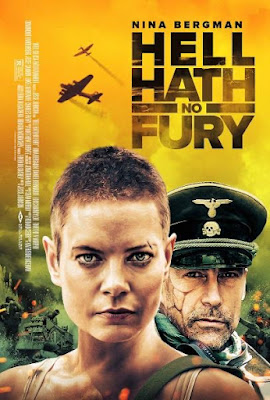Many movies depict CIA officers as the bad guys, but in the real world,
several CIA station chiefs have been assassinated while serving their country.
Tragically, Farrah Malloy will be the next to die in the line of duty. However,
her widowed husband is also a CIA officer, with the know-how to find her killers and extract
retribution in Jesse V. Johnson’s Chief of Station, which releases
tomorrow in theaters and on-demand.
Ben
Malloy just ran circles around the FSB (the former KGB) intercepting a courier drop on the
streets of Budapest, where his wife is Chief of Station. Then he met her for
their anniversary, but it was interrupted by an explosion. Supposedly, it was a
gas leak, but Malloy soon suspects otherwise. Since the agency’s general
inspector clearly has it in for him, Malloy only trusts Dez, his wife’s former
colleague in the cyber division, with his findings.
Technically,
he also trusts Nick, who will also soon start working in agency IT, but Malloy
does not want him involved. Of course, the mysterious terrorists will
inevitably target the son to get to the father.
Much
like Aaron Eckhart’s last CIA movie, The Bricklayer, Chief of Station
starts with a promising premise, but quickly reverts to standard issue payback
VOD action. In this case, Chief is worse, because it chickens out quite
cowardly, by making the FSB “friendly” rivals rather than the true bad guys.
Just ask Ukraine how the FSB really conducts their business. This is not the
mid-1990s. Audiences are craving Russian and CCP Chinese villains, because they
want to finally see payback for their oppressive crimes. Instead, the producers
apparently cared more about sales in some of most despotic territories on
earth.
It
is a shame, because Eckhart has the perfect cerebral grittiness for a
vengeance-seeking CIA officer like Malloy. Olga Kurylenko has instant action
credibility Krystyna Kowerski, an agent Malloy’s wife used to handle. However,
screenwriter George Mahaffey literally drops her into the film from out of
nowhere, after a full hour of Malloy lone-wolfing, just in time to save his
butt.
Boudica was the Druidic Joan of Arc, except she wasn’t done in by her own people.
The Romans wanted to do that themselves, but it was much harder than they
expected. The Britons rise up behind their war-goddess in director-screenwriter
Jesse V. Johnson’s Boudica: Queen of War, which opens this Friday in
theaters.
Initially,
Boudica was content as a mother and the wife of Prasutagus, the king of the
Celtic Iceni and a loyal, but unenthusiastic vassal of Rome. Unfortunately, the
king will be fatally betrayed and his kingdom divided up by the Roman governor.
He assumes flogging Boudica and executing her daughters will leave her broken.
Instead, her native druid people adopt her as the mythical liberator foretold
by legend.
Thanks
to her semi-enchanted enchanted bronze sword and some personal tutoring from the
true-believing Cartimanda, Boudica quickly develops into a fierce warrior. She
even convinces the cynical mercenary Wolfgar to put his troops under his
command. Frankly, Boudica is not a great strategist or tactician, but she maximizes
the element of surprise. Building on their momentum, they start razing Roman
strongholds throughout Celtic Briton.
Queen
of War starts
out slow as molasses, which is odd, considering Johnson is such a pro when it
comes to directing action. It is pretty clear he loved the Boudica legend so
much, he gets bogged down with sentimentality, instead of cutting to the
hacking and slashing.
People forget Germany first occupied France was during WWI—that’s why the front
line was in France. Those who collaborated the first time faced reprisals that they
repaid with interest during the National Socialist occupation. Many in turn
faced similar or worse humiliation after the Allied liberation, like Marie Dujardin,
the former mistress of a high-ranking SS officer. Ironically, Dujardin was in
fact a resistance mole, but she has nobody left to vouch for her. However, she
has knowledge of a secret stash of gold that is definitely worth something in
Jesse V. Johnson’s Hell Hath No Fury, which opens this Friday in Los
Angeles.
When
we meet Dujardin, she is cooing romantically with the ruthless Von Bruckner.
Yet, when their car is ambushed by the resistance, she claims to be on their
side. He manages to take care of his would-be executioners, but she gets the
drop on him. Or so she thought—those darned glancing face shots. She left him
for dead, but she really left him facially scarred.
That
leads to a nasty reunion when she leads three American GI’s and Major Maitland,
their Kelly’s Heroes-style officer to the cemetery, where she tells them
she hid Von Bruckner’s gold. He wants it too—and he is marching their way with
all the SS troops still loyal to him.
HHNF
is
not exactly a love letter to the “Greatest Generation.” Technically, Dujardin
is not exactly a stereotypical “woman scorned” either. However, Johnson, the prolific
action director, stages some nifty battle sequences. Stuff gets blown-up and Germans
get killed many satisfactory ways, but Johnson always keeps it all clean and
legible on-screen.
He
also has the benefit of a gritty, experienced cast, including Louis Mandylor,
who certainly knows his way around a Johnson set (including the Debt Collector movies and maybe half a dozen others). Timothy V. Murphy is a
real standout for the grizzled swagger and snarling attitude he brings as the working-class
sergeant.


